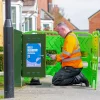Around 20 Broadband Delivery UK Contracts with BT Are in Default
Approximately 20 of the Government’s national Broadband Delivery UK projects with BT (Openreach) and other ISPs are understood to be “in default” due to a shortfall in the operator’s expected deployment of new fixed line “superfast broadband” (24Mbps+) infrastructure, but the overall picture is more positive.
We’ll begin with the positives. At the start of this year the Government announced that an estimated 95% of premises across the United Kingdom were now within reach of a superfast broadband ISP connection (here) and much of that was due to the success of their BDUK programme. Overall nearly 5 million additional premises have benefited from the extra injection of state aid to support this (details) and average take-up is strong (here).
Generally the project has been able to harness roughly £1.6bn+ of public funding, which was often matched by the private sector, to help push the service deeper into the country than private investment alone was willing to take it (commercial networks alone reached about 76% of UK homes and businesses, without the subsidy).
Advertisement
In summary, the 95% target was achieved more or less on-time and that’s no small feat for such a large and complicated project. On top of that the clawback (gainshare) clause, which requires public funding to be returned and reinvested as take-up starts going beyond 20% or so, means that we should see the 95% coverage figure climb further to “at least” 98% by around 2020. So far, so good.
The Challenges
As you might expect with a project of this size, there have however been some complications. While many contracts have completed on time and some are even ahead of schedule, others haven’t or may have experienced some complicated problems with final service delivery (e.g. delays caused by problems securing the necessary wayleave agreements for land access, challenges with digging through granite, difficulty accessing the necessary power supply or problems securing timely permissions etc.).
The situation of unfinished deployments in Wales (note: they are not one of those in default), many of which are expensive ultrafast Fibre-to-the-Premises (FTTP) based solutions rather than cheaper but slower Fibre-to-the-Cabinet (FTTC / VDSL2) services, shows just how difficult this can be (here and here). In some cases communities have even dropped out of the rollout plan because they were deemed too difficult (expensive) to reach, although equally others have been added.
The fact that these later phases of the BDUK programme, particularly the most recent extension contracts, tend to involve tackling some of the most remote rural areas (plus a few tedious suburban locations) is no coincidence. Reaching small and sparse communities in the middle of nowhere is a heck of a lot more challenging than hooking up very large villages or modest sized towns, where people tend to live much closer together.
Advertisement
The inside-out deployment model inevitably means that the hardest bits end up being last on the list to benefit and so we perhaps shouldn’t be surprised that some of these are suffering difficulties. Sources inside a number of UK councils have informed us that approximately 20 BDUK contracts were recently classed as being “in default” (the figure is alleged to have been c.23 in April) due to a shortfall in their deployments (e.g. Northumberland).
The actual figure is variable and considered to be commercially confidential, which means that officials are unable to give us the exact number. As the councillor for one such county recently told us, “The areas in question are predominantly local authorities with substantial rural areas and are a result of BT setting some fantastical targets that were not properly assessed or costed, as part of their original bids.”
We understand that this information has not yet been disclosed to the Parliamentary Select Committee that oversees the BDUK work.
A Spokesperson for Openreach told ISPreview.co.uk:
“This is a complex nationwide infrastructure project so it’s important to look at the whole picture rather than a quarter in isolation, which will inevitably show some partnerships ahead of schedule and some behind.
Our partnerships with government have delivered broadband upgrades to over 4.8m homes and businesses since 2012 and we’ve upgraded many more premises than we originally planned.
This is an unparalleled public procurement success story – underspending by over £100m to date, generating cash returns to local bodies of £129m and with hundreds of millions more expected.
We have successfully completed all of our projects to date, and we fully expect to deliver those we’re still working on.”
In fairness and as we’ve alluded to above, the term “in default” often sounds worse than it is. For example, it could in theory mean a shortfall of as little as one home being upgraded in a single quarter but in reality it’s often a fair bit worse that. Exact figures are hard to come by as the contracts remain on-going, but some areas could be behind by thousands of premises.
Advertisement
Equally what this means is that it’s possible to be “in default” during one quarter and ahead of schedule during the next, with one crucial aspect being that Openreach are only paid for work once a milestone is completed (i.e. never whilst a contract is in default). Openreach added that last year they delivered significantly more upgrades than they had previously committed to (776k premises at 24Mbps+).
A DCMS Spokesperson told ISPreview.co.uk:
“Our broadband rollout has helped make superfast speeds a reality for more than 95% of the UK, on schedule and under budget. We are still reaching thousands more homes and businesses every week, even though we are now working in the most challenging terrain and environments.
Whilst day to day management of contracts is managed at local level, where there has been any contract slippage BDUK has worked in partnership with suppliers and local authorities to ensure plans are in place to expedite the ongoing rollout.”
One other point to make is that BT do account for the vast majority of BDUK contracts, although some smaller alternative network ISPs have secured contracts (Gigaclear, Airband etc.) and they may also be included in the overall total of “in default” contracts.
Mark is a professional technology writer, IT consultant and computer engineer from Dorset (England), he also founded ISPreview in 1999 and enjoys analysing the latest telecoms and broadband developments. Find me on X (Twitter), Mastodon, Facebook, BlueSky, Threads.net and Linkedin.
« Technical Nightmare as UK Security Minister Seeks to ID Net Users
Virgin Media Launch Special Broadband Deals for UK Students »


















































Comments are closed